

Cientistas portugueses identificam nova droga na Europa. Uma nova droga foi identificada pela primeira vez na Europa por uma equipa da Faculdade de Ciências da Universidade de Lisboa, em colaboração com o Laboratório de Polícia Científica da Judiciária.
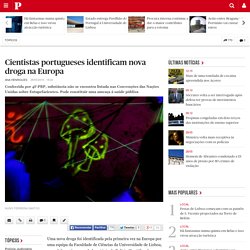
Which drugs do you take? US and the UK compared by the global drug survey. Which drugs do people take?
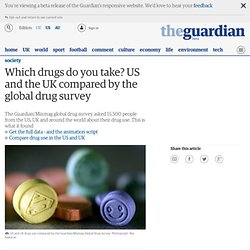
The Guardian/Mixmag survey is one attempt to explain the facts behind this controversial issue - which sees users claim that more of them use cannabis than energy drinks. Conducted by Global Drug Survey, we wanted to know which drugs people take, how often and why. The survey of 15,500 people studied a wide range of illict and legal substances, from alcohol and cannabis to cocaine and MDMA - as well as newer drugs such as mephedrone and synthetic cannabis. These are the results. The answers came from countries around the world, mostly the UK and US.
. • fifth of young drug users admit to taking "mystery white powders" without any idea what they contain - 15% of overall respondents say they have taken a unknown white powder in the last 12 months, a third admitting its was supplied by someone they didn't trust. This is how we animated the results: Global Drug Survey. S DRUG SURVEY: THE RESULTS. WDR_2012_web_small.pdf. Global drug survey to rank Australian use. Party drugs ...
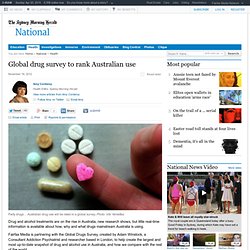
Australian drug use will be rated in a global survey. Photo: Viki Yemettas Drug and alcohol treatments are on the rise in Australia, new research shows, but little real-time information is available about how, why and what drugs mainstream Australia is using. Fairfax Media is partnering with the Global Drugs Survey, created by Adam Winstock, a Consultant Addiction Psychiatrist and researcher based in London, to help create the largest and most up-to-date snapshot of drug and alcohol use in Australia, and how we compare with the rest of the world. Take part in the survey here Dr Winstock said last year's survey, which 15,000 people filled out globally, including 500 from Australia, showed that, for many, drug use was characterised by confusion and dishonesty. “People are appalling at knowing how their drug use compares to other people,” he said. Advertisement Dr Winstock said he created the project to capture a broader snapshot of drug use than is usually available.
World's biggest independent drug use survey is launched. The world's biggest independent survey of drug use, collecting detailed data on the drug experiences of tens of thousands of people, launches on Thursday.
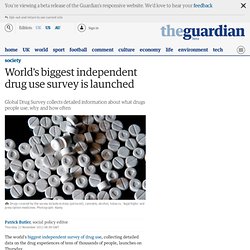
The Guardian, along with a range of media partners across the globe, is supporting the survey, which asks participants about what drugs they use, why they take them and how often, and what the social, medical and legal consequences of their drug use are. Drugs covered by the survey include cocaine, ecstasy, cannabis, ketamine, mephedrone, alcohol, tobacco, "legal highs" and prescription medicines such as temazepam, Viagra and opioid painkillers. You can access the 2013 drug survey here. Last year's survey was completed by 15,500 respondents.
Cannabis. New Insight Into How Brain ‘Learns’ Cocaine Addiction - 08/01/2013. A team of researchers says it has solved the longstanding puzzle of why a key protein linked to learning is also needed to become addicted to cocaine.
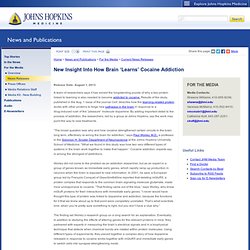
Results of the study, published in the Aug. 1 issue of the journal Cell, describe how the learning-related protein works with other proteins to forge new pathways in the brain in response to a drug-induced rush of the “pleasure” molecule dopamine. By adding important detail to the process of addiction, the researchers, led by a group at Johns Hopkins, say the work may point the way to new treatments. “The broad question was why and how cocaine strengthened certain circuits in the brain long term, effectively re-wiring the brain for addiction,” says Paul Worley, M.D., a professor in the Solomon H.
Snyder Department of Neuroscience at the Johns Hopkins University School of Medicine. “What we found in this study was how two very different types of systems in the brain work together to make that happen.”